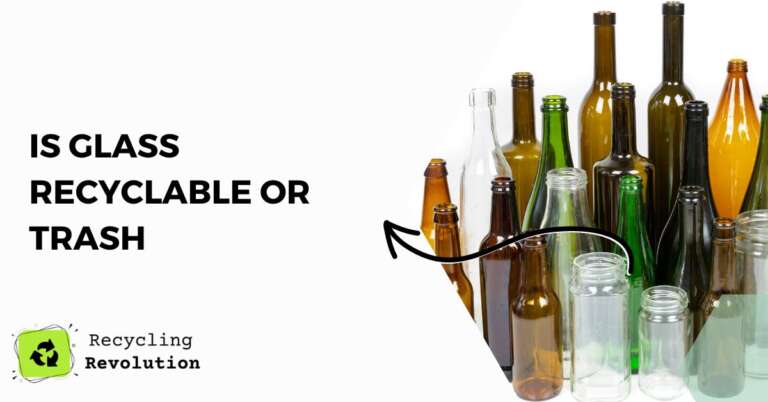At its core, glass recycling is a fascinating and eco-friendly process. The ability to transform an old glass bottle into something completely new and different is a testament to the wonders of modern recycling technology. Glass recycling not only benefits the environment but also contributes to the sustainability of resources.
TL;DR: Glass is a highly recyclable material. It can be recycled indefinitely without losing quality or purity. However, the recycling process can be complicated due to the varying types of glass and recycling facilities available. For successful recycling, proper disposal and sorting of glass items are crucial.
How To Recycle Different Types of Glass
When talking about glass, we often imagine our everyday items like beverage bottles, food jars, and window panes. But not all glass is created equal. Here’s a brief rundown:
- Container Glass: This includes bottles and jars used for food and beverages. Container glass is highly recyclable.
- Flat Glass: This refers to window glass, mirrors, and glass from vehicles. While technically recyclable, it’s often contaminated with other materials making the recycling process more challenging.
- Specialty Glass: This category includes items such as light bulbs, Pyrex, and ceramics. These are typically not recyclable due to the specific properties they possess.
How Is Glass Recycled?
Recycling glass is a multi-step process that begins with you and ends with a brand-new glass product.
- Collection: Glass items are collected from recycling bins and brought to a recycling facility.
- Sorting: Collected glass is sorted by color and type. This step is crucial for producing high-quality recycled glass.
- Cleaning: The glass is then cleaned to remove any non-glass materials (e.g., bottle caps, labels).
- Crushing: The clean glass is crushed into small pieces called cullet.
- Melting: The cullet is melted in a furnace at high temperatures.
- Molding: The melted glass is then molded into new products and sold back to consumers.
The Crucial Role of Consumers
As a consumer, you play a significant role in ensuring the success of glass recycling. Here’s what I recommend:
- Know your local recycling rules: Not all recycling facilities have the capabilities to recycle all types of glass. Do your research to know which types of glass are accepted in your local area.
- Sort and clean your glass: Prior to recycling, make sure to separate your glass by color and type and clean it to remove any non-glass materials.
- Drop-off at a recycling center: If curbside recycling isn’t an option for glass in your area, consider dropping it off at a recycling center.
Navigating the Challenges in Glass Recycling
Despite the undeniable benefits, glass recycling is not without its challenges. The recycling process can be labor-intensive and costly, and there are often logistical hurdles to overcome.
Contamination Issues
One of the main challenges in recycling glass is contamination. Glass can be easily contaminated by non-glass materials like paper, metal, and other types of glass. When this happens, the quality of the recycled glass is significantly reduced, and in some cases, it may not be recyclable at all.
I recommend being diligent when sorting and cleaning your glass items for recycling. Remove any labels, caps, or non-glass materials and sort your glass by color and type. This not only improves the quality of the recycled glass but also makes the recycling process more efficient.
Logistical Hurdles
From a logistics perspective, glass recycling can be complicated. Glass is heavy, which makes transport more expensive. Furthermore, not all recycling facilities have the capabilities to recycle glass, often due to the lack of proper equipment or the high cost involved.
To help address this issue, some cities offer glass recycling drop-off stations where residents can bring their glass items for recycling. If your local recycling program does not accept glass, look for nearby drop-off stations or consider other methods like reusing glass items at home.
Repurposing: An Alternative Way To Recycling
If recycling glass is not an option in your area, or if you’re looking for ways to reduce your environmental footprint even further, consider repurposing your glass items.
Repurposing, also known as upcycling, involves transforming an item into something new without breaking it down into its raw materials. This process not only reduces waste but also saves energy and resources compared to recycling.
Here are some ideas for repurposing glass items:
- Glass Bottle Planters: Cut off the top of a glass bottle and fill it with soil to create a unique planter for succulents or small plants.
- Jar Storage: Use glass jars for storing leftovers, dry goods, or even as a stylish pencil holder.
- Candle Holders: With a little creativity, glass bottles and jars can be turned into beautiful candle holders.
The possibilities are endless when it comes to repurposing glass. All it takes is a little imagination and creativity!
The Environmental Impact of Glass Recycling
Recycling glass is a vital process that helps conserve natural resources and reduce energy consumption. By melting and reshaping used glass, nearly 100% of it can be recycled.
This process saves over 30% of the energy required to produce glass from raw materials. If not recycled, glass takes up to 1 million years to decompose in landfills, causing space constraints and potential environmental hazards.
By recycling just one glass bottle, we prevent 0.67 pounds of CO2 emissions and save enough energy to power a computer for 30 minutes. Recycling glass, therefore, is not just economical but a crucial environmental responsibility.
How You Can Contribute to Glass Recycling
At the end of the day, the success of glass recycling largely depends on the actions of individuals. By properly disposing of your glass items and making sure they end up at a recycling facility, you’re making a significant contribution to environmental conservation.
Remember, every glass bottle or jar that’s recycled instead of ending up in a landfill makes a difference. So, let’s do our part to ensure that glass continues to be recyclable, not trash.
Is There a Better Alternative to Glass?
While glass is a durable and recyclable material, some argue that alternatives like plastic or aluminum are more efficient to recycle.
However, one of the unique advantages of glass is that it can be recycled indefinitely without losing quality or purity. On the other hand, materials like plastic degrade each time they are recycled.
For sustainability, I recommend choosing glass over other materials, especially for items you use frequently.
Conclusion
Glass recycling is eco-friendly and helps conserve resources. All glass can be recycled many times without losing quality. But, not all glass is the same, and different kinds can make recycling tricky.
Bottle glass is good to recycle, but things like windows or special glass from light bulbs aren’t always recyclable. Proper sorting and cleaning by color and type are key for recycling glass. If your area doesn’t recycle glass or if you want to be more eco-conscious, think about repurposing glass at home. Every recycled or reused glass item can save energy and reduce CO2 emissions, making a big difference for our planet.
FAQ
Can all types of glass be recycled?
No. While most container glass is recyclable, other types like specialty glass (light bulbs, ceramics) often cannot be recycled.
Is it necessary to separate glass by color for recycling?
Yes. Glass is separated by color during recycling to ensure the quality of the recycled products.
What can recycled glass be turned into?
Recycled glass can be turned into various products, including new bottles, jars, fiberglass, and even construction materials.
Note: Recycling rules and capabilities vary by location. Always check with your local recycling center to know what types of glass they accept.

